Kate Larking's Blog: Anxiety Ink, page 26
December 30, 2016
2016 Goals: Fourth Check-In & Wrap Up
Reading my 2016 goals post from January is bittersweet. It’s so full of energy and positivity. I was so excited to list my goals and begin tackling them because I did so well in 2015!
This wrap-up post is not going to exude those emotions, fair warning. Where I stand with my goals right now is not at all where I thought I’d be. I have detested much of 2016 and am so ready to move on.
So many things combined this year to frustrate my goals. Health issues, mental struggles, changes, professional and personal frustration, and a lack of motivation are a few of the roadblocks I encountered this year.
That said, lots of people have accomplished more with worse hardships, which means I have to find a better balance. Reading my goals updates throughout the year frustrates me further. Each and every time I identified my issue…and then ignored the issue. Mostly, my problem is pushing things off. I know better, and I know my current means of accountability are not working. This coming year, things need to be in my face, not part of the white noise of my life.
As I said in my post-NaNo write-up, balance is going to be my word for 2017. While I’m looking forward to the New Year and am already setting myself up to actively accomplish my goals, I have to look back one last time:
Write close to 3 000 words per week, half that for blog weeks –while I accumulated words for a while there with my writing prompt work, I grew disheartened by my lack of WIP progress. I need a better means of measuring this goal next year because I refuse to repeat this habit of not writing.
Shop “Brew Disaster” around –despite my best intentions I looked at NO markets this year. Why? I wish I knew.
Shop my literary stories around –see the comment above, again.
Read a minimum of 68 books over the year –I identified my issues with this, this being reading progress in general. A lack of evening routine is largely to blame. As is my favourite way to read: binging. I love reading a book in 1-3 goes. I need to learn to appreciate smaller sips. Some way. Some how. Still, I’ve read 34 books this year. Identical to last year, which is incredible. And a minor total for me, but better than nothing.
√ Introduce something new to Anxiety Ink –as a group we are really on top of Anxiety Ink. I’m crossing this one off the list.
Write a new short story –this one is still back-burnered, but I have two stories I want to write and submit in 2017. I failed this year, but I’m happy I haven’t given up in the long run.
Learn how to meditate –I still don’t know why I won’t do this! My time management sucks.
√ Keep up the exercise to boost energy –I can cross this off my list as a success! My health was priority number one this year and it overshadowed other things. That might not be a bad thing as I move forward. I still have a bit of a health journey to travel in 2017 since the answers I got about some things require more investigating. At least my symptoms are manageable and I am functional.
Run 5 km without stopping –my hip is still not up to par since my last check-in, so I have to leave this one incomplete. I’ve got both my massage therapist and chiropractor on it, so I hope I can get back into running next year. Injuries suck.
Cook more often –I like cooking, but my mom and I do not see eye to eye on this process. Her kitchen bothers me, which is why I don’t like to be in it. However, it is her kitchen and she does the most in there. I don’t know what I want to do about this goal next year.
Try something new –this is my totally vague personal goal that I did not succeed at.
√ Be POSITIVE –I would say I half succeeded at this goal. I had periods of being wonderfully positive and then stretches of being abysmally negative. I need to better manage the influence of outside sources on this. I let the actions of others cause negativity too easily.
Participate in NaNoWriM0 2016 and exceed 2015’s word count –we all know how this went and I am still really mad about it.
Finish writing RA2 –Obviously, this did not happen.
Turn RA1 into a readable manuscript –this was tabled to 2017 in October.
Read a Shakespearean play –this is another, why didn’t I freakin’ do this?, goal.
√ Be greener –I think I can cross this safely off my list as accomplished. I want to tackle it again next year, but in a different manner. At least I have some inspiration from another blogger.
√ Set goals for myself at the day job and hit them –2016 was my year to shine at work. I won four awards and got an “exceeded expectations” on my performance review. This means the pressure is on for next year! I had a few goals outlined that I didn’t excel at, but I have to come January. I’m trying not to worry, but I’m not so great at that.
Edit and complete my crow story –I am tabling this for late 2017 as I want to write the other short stories I have in mind before I tackle this one again.
Draw more –yet another neglected item that I failed at.
5 out of 20 is not good. That’s a failing grade. Can you see why I’m ready to close the book on this year?
How did your goals go?
The post 2016 Goals: Fourth Check-In & Wrap Up appeared first on Anxiety Ink.
December 27, 2016
2016 Goals Final Check-in
2016 has been a huge year for me. I started the year battling depression, I worked more overtime than ever, I supported my wife through her pregnancy, I became a mother to a wonderful little girl, and I overthought a bunch of things.
Writing + Publishing Goals:
Comic
Chapter 1 – March 1, 2016 – DONE
Chapter 2 – June 1, 2016 – Eventually Met…in November.
Chapter 3 – November 1, 2016 – DONE
Tame the POD monster -I’ve started it? Does that count? I DID tame the POD monster for a charity anthology, but not for the comic.
Keep Anxiety Ink going – THE SITE IS STILL HERE! I did struggle, especially in the beginning of the year when I depressed and at the end of the year when I was balancing parenting.
Administrative Goals:
Set up the Crash and Burn Patreon – DONE. It is here if you would like to support the comic!.
Website Redesign – I still need to do this. But I do have a theme I like that I need to leverage for my redesign.
Tidy up Twitter and tumblr – Yeah, nope. Didn’t happen. And, as I went through the year, I realized I simply wasn’t invested in making this happen. I am looking for a social media platform to leverage that will suit me better than these.
Learning Goals:
Continue learning Japanese – Yeah, this one fell off the wagon because of baby.
Study comic book writing – Okay, so, I learned by doing? *stares guiltily at the few books on comic writing and digital storytelling she wanted to break into*
Read more – I didn’t read too much this year, but I did try. I am enjoying the books I do look into but I haven’t been finishing a lot of titles. I don’t add books I don’t finish to Goodreads usually, but I may need to change that policy.
There are a number of things that I did not think would happen this year that ended up taking place:
Sell Crash and Burn at Conventions – This happened! We sold Crash and Burn at…seven conferences?! *counts them out again* Yes, 7! I expected we might hit TWO at the beginning of the year. And we hit SEVEN?! I know the artist and I learned a lot about what places were worth our time and how to survive selling for hours on end.
Coordinate, Write for, Format, and Publish a Charity Anthology for Sirens – Thi project that crept into my life after I made my writing goals list. Queens & Courtesans, an anthology I co-created, is written, edited, formatted, and now published!
Submit a Poem – I actually, somewhat impulsively, submitted one of my poems for consideration in an anthology. If you can believe it or not, this happened after my child was born and before December 2016. In that half a month, I saw a posting and seized it. I just itched to send something out. To just go for it. And I have no idea how it will go but I did it.
The post 2016 Goals Final Check-in appeared first on Anxiety Ink.
December 26, 2016
Final Check-In: 2016 Goals
For me, 2016 cannot end fast enough. Four deaths and a crapshoot of a presidential election, various stressors (the bad kind) in work and personal life, and a dearth of writing productivity all result make me feel like I’m going nowhere fast. But let’s take a look at how I did with my goals for the year . . .
The tl;dr version? Terrible. For the first year since we started doing this here on the blog, I look over my goals and progress throughout the year and feel a sort of failure.
The good news is that I seem to have hit an extreme-for-me extraverted phase. I can’t think of a much better time of year for that sort of thing.
Travel: I made it to Florida in the spring, ReaderCon in the summer, and a gorgeous wedding in Canada in the fall.
Theatre: because of the comedy I acted in this spring, I discovered how debilitatingly exhausting it is to be in a a show I’m not passionate about. I discovered the wonders of stage managing with the fall show, which taught me how to be a better version of me. I even took a master class on movement for the stage – something I struggle with.
I also participated in the 24-Hour Play Festival and became more active in the troupe (a forgotten goal from the start of the year).
Social: I spent most of 2016 in an introverted phase. Regular plans never came to pass, except for Wednesday night Writing Bitch Sessions. Social and writing, all rolled into one! And I have spent some excellent time with friends.
My personal blog started off well enough, but the last post was in September. I went radio silent to focus on stage managing, but then the silence kept growing until I didn’t quite know how to break it.
Writing: the rough draft from the start of the year still languishes, waiting for me to go back to it. I put it on hold to edit a novel. The edit should have been done months ago, but this year. So now the editing is holding to make space for a short story. It won’t have to hold much longer because the deadline is the end of this month.
If I make the deadline, that will mean two stories submitted this year, which is better than 2015!
So I’m just starting to feel like I’m getting my feet back under me. In time for the year to end, but I’ll take whatever I can get, at this point.
The post Final Check-In: 2016 Goals appeared first on Anxiety Ink.
December 23, 2016
Tough to Tackle Reads: Heart of Darkness by Joseph Conrad
My second edition of Tough to Tackle Reads is not quite the bang that Gone with the Wind was, but I think I still managed to pick a doozy.
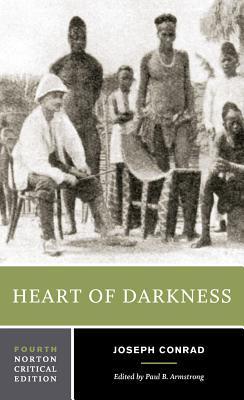 Canada/USA
Canada/USAIt’s difficult to think of a way to start discussing Joseph Conrad’s Heart of Darkness. Because it’s an allegory, a dense one at that, it is exceedingly difficult to talk about on a surface level. Even prepping for this post I found myself unpacking each part like I was preparing for an essay.
So I apologize in advance for the parts of this post that read like an essay. I used barely any of my notes in order to spare you, though I enjoyed myself. Word to the wise, these are merely my rudimentary thoughts as I have not consulted outside sources beyond the introduction in my anthology*.
This is my second time reading Heart of Darkness. I read it much slower this time around so that I could have long moments to mull each part separately and then as a whole. I loved it this go as much as I did the first time. There is so much going on on so many levels that you can never get bored reading it.
I know everyone beyond high school age already has an ingrained reaction to the title, but I hope I can convince you that this story is worth your time below.
The Book
Heart of Darkness is a novella, published in 1899, derived from Conrad’s personal experience in the Congo in 1890. It is as much a memoir, expanded beyond fact, as it is an exploration of human darkness, colonialism, and the ivory trade.
While it is set in Africa, it is framed in such a way as to be an oral story told aboard a ship called the Nellie which is docked on the Thames. A man aboard the ship, Marlow, who is essentially a pseudo Conrad, entertains the few members of the crew with a story about the time he sailed up the river into the centre of Africa.
If only the whole story was as simple as that.**
The Author
Joseph Conrad, 1857-1924, was born in Poland as Józef Teodor Konrad Korzeniowski. His younger years were rather turbulent; his father was a Polish patriot exiled to Russia for his polish nationalist activities as Poland was under Russian rule at the time. He died young leaving Conrad to be raised in part by a maternal uncle. In 1874, at age 17, Conrad travelled to Marseilles, France and launched his sea-faring adventures, which eventually lead to his learning the English language (his third) and becoming a naturalized British subject. Also during this time he travelled to the heart of Africa up the Congo River, which lead to the later writing of Heart of Darkness.
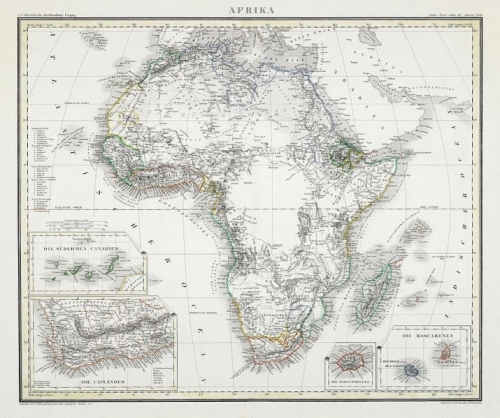 Africa 1861 via Bookdrum.com
Africa 1861 via Bookdrum.comThere were some difficulties during his marine days and with the help of a sympathetic ear belonging to the novelist John Galsworthy, paired with the publication of his first novel Almayer’s Folly in 1895, Conrad ditched his sea faring life for that of a writer.
He settled in London and married an Englishwoman in 1896, using his many years of adventures in exotic locales to write a myriad of deep, questioning fiction. It is said that his geopolitical understanding, no doubt influenced by his upbringing and early life at sea, and his ability to bring psychological depth to any narrative, have left their mark on English Literature and influenced many important writers.***
Length
I think the fact that this story is only around 30 000 words, or roughly 200 pages, makes it that much more difficult. So much is packed into such a small piece that unpacking it is hard. But so worth it. You might pick up this book and flip through the pages and think, “Heck, this will fill an afternoon.” You can absolutely read it in an afternoon, though you are going to be slightly cross eyed and brain-fried at the end. Or perhaps that’s just me.
Difficulty
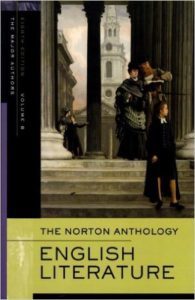 Canada/USA
Canada/USAThis story is notorious as one you either love or hate. I give it a 4/5 as far as difficulty goes because while it is dense the language is clear. While no one writes a sentence like Conrad his prose are very straightforward.
I actually find the structure of the paragraphs to be the most difficult aspect of Heart of Darkness. One, they’re long. I mean long. Longer than Saramago paragraphs (have you read the opening of Blindness?). Two, back in the late 1800s there were not a lot of rules in regards to novels or short fiction since they were a relatively new art form. The beautiful dialogue breaks we all know and love are nowhere to be found in Conrad’s story –until the final scene which is written much like an interview (since that’s what it is).
The segmentation of the story and Conrad’s narrative choice also ensure that the story keeps you on your toes. All of this combined means you really have to pay attention. Heart of Darkness is not designed for light reading, but there’s purpose behind each choice.
Why You Should Read Heart of Darkness
It’s an early look at Imperial Criticism. On its surface, Heart of Darkness can read like any popular Victorian adventure tale. But as with many from that time period, like Gulliver’s Travels, Conrad is showcasing so much more.
According to my anthology’s introduction to Heart of Darkness, “Conrad had as a child determined one day to visit the heart of Africa” (2328). That dream was realized in 1890 and from that visit this story was born, well, really from the nightmares that Conrad witnessed firsthand, this story was born.
A few years after Conrad’s visit “…the appalling abuses involved in the naked colonial exploitation that went on in the Congo were exposed to public view, and international criticism compelled the setting up of a committee of inquiry in 1904. From 1885 to 1908 masses of Congolese men were worked to death, women were raped, hands were cut off, villages were looted and burned. What Conrad saw in 1890 shocked him profoundly and shook his view of the moral basis of colonialism, or exploration and trade in newly discovered countries, indeed of civilization in general” (2328).
Heart of Darkness is as much a firsthand witness account of evil as it is a moral story urging colonizers to truly look at what their actions result in. It is a working through of horror. Much like Marlow in the story, “The Congo experience permanently impaired [Conrad’s] heath; it also permanently haunted his imagination. The nightmare atmosphere of Heart of Darkness is an accurate reflection of Conrad’s response to his traumatic experience” (2328).
Conrad was mentally and physically altered by Africa, whether that was a good thing for him is debateable. However, I have no doubt that this story, added to the voices of all the others who condemned the exploitation of Africa and the treatment of its peoples, lead to the eventual cessation of such exploitation.
Before anyone jumps on me I know that this single white male individual did not stop colonialism or pull the Europeans out of Africa. I also know that Africa is still in pieces because of imperialism. I know that many Africans are still exploited. I do believe this story helped form a platform for other writers, like the inimitable Achebe, to write about imperialism and condemn the traces still felt in the modern age.
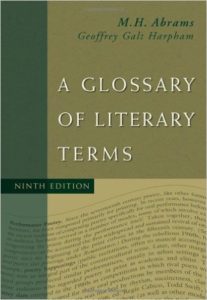 Canada/USA
Canada/USAAllegory gives a story so much depth and they’re fun to dive in to! Ok, so I’ve mentioned allegory a couple of times here so I will define the word to ensure we are all on the same page. According to M.H. Abrams and Geoffrey Galt Harpham, “an allegory is a narrative, whether in prose or verse, in which the agents and actions, and sometimes the setting as well, are contrived by the author to make coherent sense on the ‘literal,’ or primary, level of signification, and at the same time to communicate a second, correlated order of signification” (A Glossary of Literary Terms. Ninth Edition. Wadsworth Cengage Learning. 2009. 7).
Clear as mud, right? Merriam-Webster online makes it a bit clearer: “a story in which the characters and events are symbols that stand for ideas about human life or for a political or historical situation.”
Heart of Darkness is rife with allegories on a number of topics, the main one being the colonization of Africa by Europeans, the exploitation of Africans by Europeans, and the creation of the ivory trade, whose legacy is still felt appallingly through Africa and Asia. It also delves into ideas of truth and lies and basic human good, but I’ll get to that later. Conrad himself wrote that Heart of Darkness is more than a story of a man that goes mad in the middle of Africa (2385), that’s the surface or “primary” story. The hidden meaning has to be fished out.
Looking at the first allegory, colonialism, Kurtz is the main symbol. Not only has he made a lair in the heart of the Congo (read the descriptions, it’s a lair), but he has convinced the Congolese people that he is a deity, and surely the only way to not incur his wrath is to bestow heaps of ivory upon him.
He was a man gifted with an enthralling voice, a voice of conviction, and he used it for evil purposes. Compared to all of the other employees of the Belgian company, Kurtz sends the most ivory back to Europe. Except his means have garnered the wrong kind of attention, which is why Marlow is piloting a boat into the heart of darkness to retrieve him in the first place. The company is not appalled with his tactics, he’s just using them at an inopportune time.
A second allegory involves the heart of darkness itself, that is, the heart of Africa. This ties in to Conrad’s exploration about basic human good, or morals, as mentioned before in the longer bit about colonialism. The force of the Congo, its isolation and oppression, force one to look deep into themselves. You can’t read this story and fail to see the power the setting has over every character, even those on the ship on the Thames. I’m going to share a long passage below because it’s my favourite one in the whole story and Conrad says it best.
As he relates travelling up the river towards Kurtz, Marlow tells his fellow crewmen:
“Going up that river was like travelling back to the earliest beginnings of the world, when vegetation rioted on the earth and the big trees were kings. An empty stream, a great silence, an impenetrable forest. The air was warm, thick, heavy, sluggish. There was no joy in the brilliance of sunshine. The long stretches of the waterway ran on, deserted, into the gloom of the overshadowed distances….The broadening waters flowed through a mob of wooded islands; you lost your way on that river as you would in a desert, and butted all day long against shoals, trying to find the channel, till you thought yourself bewitched and cut off for ever from everything you had known once—somewhere—far away—in another existence perhaps. There were moments when one’s past came back to one, as it will sometimes when you have not a moment to spare to yourself; but it came in the shape of an unrestful and noisy dream, remembered with wonder amongst the overwhelming realities of this strange world of plants, and water, and silence. And this stillness of life did not in the least resemble a peace. It was the stillness of an implacable force brooding over an inscrutable intention. It looked at you with a vengeful aspect….When you have to attend to things of that sort, to the mere incidents of the surface, the reality [of piloting a boat]—the reality, I tell you—fades. The inner truth is hidden—luckily, luckily. But I felt it all the same; I felt often its mysterious stillness watching me at my monkey tricks….” (2352-2353)
Marlow survives this immense look inwards. Though near the end of the story he admits that he did not leave the Dark Continent unscathed, “I found myself back in the sepulchral city resenting the sight of people hurrying through the streets to filch a little money from each other, to devour their infamous cookery, to gulp their unwholesome beer, to dream their insignificant and silly dreams. They trespassed upon my thoughts. They were intruders whose knowledge of life was to me an irritating pretence, because I felt so sure they could not possibly know the things I knew” (2381).
As for Kurtz, he is an emaciated creature bodily removed from the heart of darkness once they find him, left with nothing but his voice; a voice that grows dimmer as Marlow steers him and the rest of the crew out of the Congo. You can imagine what his fate was; and as for his final comments on his own look inward: “The horror! The horror!” (2379).
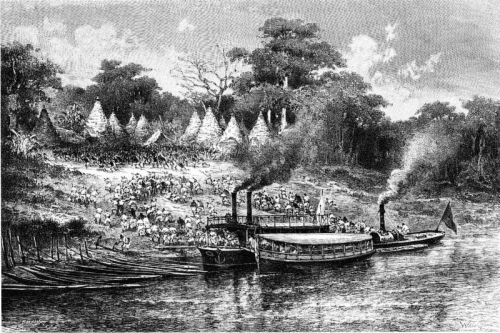 via Bookdrum.com
via Bookdrum.comLastly, I want to comment on Conrad’s exploration of truth and lies. I haven’t quite wrapped my head around what I think Conrad was saying about both, and their interconnectedness, so bear with me as I try to figure it out.
Kurtz is obviously a liar. He has this supreme convincing voice that gives credence to the lies he spews because he utters words with so much conviction. He’s proven to be a liar; he’s actually proven to be a scared little man who couldn’t deal with the fact that deep in his heart he is not a good person.
I think this is an important aspect of the story because even before we meet Kurtz, Marlow tells his listeners, “I laid the ghost of his gifts at last with a lie” (2363), and then immediately backtracks to where he’s actually supposed to be in his narrative.
This sentence refers to the ending of the story, an ending that seems bizarre and inconsequential until you remember this line near its middle. Heart of Darkness concludes with an interview between Marlow and Kurtz’s fiancée. Through her, Marlow learns that Kurtz was seen as an extraordinarily good man before his venture to Africa. She tells him, “…his example…Men looked up to him—his goodness shone in every act” (2385).
It’s unclear whether her comments are those of a grief-stricken woman who wants to remember only the good of the man she loved, or whether her words actually hold some weight. Marlow plays along with her because she is horribly bereft at Kurtz’s loss. His final comments to her, and to us, which are an outright lie, lead me to believe that perhaps she isn’t simply sanctifying the memory of her fiancé.
“I pulled myself together and spoke slowly. ‘The last word he pronounced was—your name.’ I heard a light sigh and then my heart stood still, stopped dead short by an exulting and terrible cry, by the cry of inconceivable triumph and unspeakable pain. ‘I knew it—I was sure!’…She knew. She was sure” (2385).
After this rather ironic commentary, Marlow carefully leads us out of his story as he questions whether lying to Kurtz’s fiancée was the right thing to do. It was not the justice deserved to be delivered upon the memory of the man whose evil will forever leave a mark on the people of the Congo, but Marlow does not believe the poor woman should have to carry the darkness of his actions.
The truth is a heavy burden. Lies are easier, as Kurtz can attest. Speaking both has innumerable consequences. Is Marlow’s final lie an aspect of moral good or the perpetuating of more bad? Christians are supposed to answer for their sins, but are their loved ones supposed to answer too?
I’m a person who believes in truth but I also think white lies are important when it comes to not hurting people in some circumstances. The world is not black and white, neither are truth, lies, or morality. Perhaps that is Conrad’s parting comment. He did in fact write to a friend saying, “the last pages of Heart of Darkness where the interview of the man and the girl locks in—as it were—the whole 30,000 words of narrative description into one suggestive view of a whole phase of life, and makes of that story something quite on another plane than an anecdote of a man who went mad in the Centre of Africa” (footnote 2385).
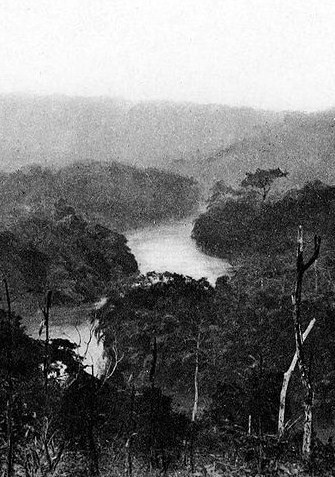 Congo River 1888 via Bookdrum.com
Congo River 1888 via Bookdrum.comThe idea of self-analysis and looking deeply inward leads down an unexpected path in Heart of Darkness. Whether you’re a person who believes that people are fundamentally good, or you’re a person who believes the opposite, the story does not disappoint. I love how Conrad questions whether any of us will survive that ultimate look at our own hearts; and how he surprises us with who does survive it in the story. Yet everyone comes out of such analysis marked. I discussed this in detail above so I won’t bore you with repetition.
The construction of the story makes it lively. While some would say it’s fragmented, and I wouldn’t disagree, I like that aspect because it allows you to take a break from the horror and the philosophical exposition. The movement in time suits the story, since it is constructed like an oral history and we know that people aren’t completely linear as they remember facts.
The construction and demolition of false idols was not unexpected in a Victorian story, but how it relates to our current experience is uncanny. I am a big believer in secularism but I am also well versed in a few branches of theology. The pervasiveness of religion, mostly the Christian sort, is not quite the same thing in Canada as it is in the US, but there are still people throughout the world propped up as false idols in our reality. It’s hard to get into this idea in one paragraph –it deserves its own essay– but I think we would do well to heed the warning of Kurtz and remember he is just a loud, compelling voice spouting lies. Always look at the source, always look at the truth.
What I Had Trouble With
I appreciate Conrad’s criticism of the ivory trade and his dislike of those who exploit the people of Africa. I appreciate that Marlow affirms those attitudes. Yet it’s very obvious that writing this story was as far as Conrad was willing to go to go against it. Marlow himself would rather look away from the horrors he witnesses in the Congo than stop them, or stop to help those that are being brutalized by the Europeans.
That is likely a harsh commentary since one man against an entire system isn’t going to accomplish a lot. He did set a foundation of criticism, I’ll give him that. Sharing the horror instead of helping to cover it up is also more than a lot of others in his position would do, I suppose.
The blatant racism is unpalatable at times but, again, it’s not so much Conrad’s attitude as it is Europe’s attitude. Conrad was likely writing with an engrained sense of revulsion towards the other, but I think he did acknowledge it at times and showed that he was much more tolerant than others like him. Not that that’s much to be cheerful about. But he did live through his fair share of being the other considering he was a Polish individual living under the thumb of the Russian empire, which has not been kind to Poland or its people across history.
My next pick needs to not be racist. I need to remember this.
Final Thoughts
I said a lot about a lot of things above, so I’ll conclude with the physical act of reading. The easiest way to read Heart of Darkness is to imagine it is a play within a play. You need to actually visualize the group of men, grizzly English seamen (think Pirates of the Caribbean if that helps you), and imagine that one of them is a talker. I mean a real chatter, who likes to gesticulate like a madman.
Then you have to put yourself in the group of men. You are physically on that boat sitting directly in front of Marlow. He’s talking right to you because you’re one of those people who doesn’t know how to extract themselves from a conversation and he’s latched on to you like a lifeline.
Then you have to visualize that chatty guy as a younger man who makes his way to the coast of Africa and becomes the captain of a steamer. The hard part is taking note when he breaks out of his story, when he flips back between Old Marlow and Young Marlow. You have to watch for the clues. Watch his hands, if that helps.
If you read Heart of Darkness like it is a story being told to you, spoken to you, you will have a much easier time of the actual reading.
As for the allegory, if you feel like you’re missing it, don’t worry. Some people are better at reading into it than others. You can give yourself a couple of chances if you like so that you’re not distracted by the surface story when you go back and look at the hidden meaning. And if you really can’t see it, at least you read a really great story.
I hope you’re willing to give Heart of Darkness a try and I sincerely hope you enjoy the experience. Either way, let me know!
*“My anthology” refers to this text because it’s a lot easier to write: The Norton Anthology of English Literature, The Major Authors, Volume B: The Romantic Period Through the Twentieth Century and After. Eighth Edition. Ed. by Stephen Greenblatt et al. W.W. Norton Company, New York. 2006.
**My comments under The Book are an amalgamation of information I derived from reading Heart of Darkness, the introductions in my anthology, Wikipedia’s entry on Heart of Darkness, and this CliffsNotes pages.
***Biographical information on Conrad is borrowed exclusively from my anthology, paraphrased and condensed.
****During my image search I stumbled upon Bookdrum.com. If you want a fully interactive, visual application to supplement your reading of Heart of Darkness, or any other book, I urge you to check it out. I was blown away.
*****Please note that this post contains affiliate links. If you click on a link and decide to purchase an item I’ve mentioned I will receive a small commission by the seller at no extra cost to you. All funds are put back into Anxiety Ink. Thank you in advance for your support.
The post Tough to Tackle Reads: Heart of Darkness by Joseph Conrad appeared first on Anxiety Ink.
December 20, 2016
Seek Support From your Creative Community – New Mom Writing Series
Second post in my New Mom Writing series. Are you ready? Today’s post is about creative community.
Your Creative Community is not Homogenous
Writer friends come in different varieties. It’s really important to note where people fit into these categories. Why? Because they will mean different things to you in the long run.
Peers – These are the people who you believe are on the creative journey with you, on par with you, and are facing similar challenges around the same times you are.
Powers – Authors and writers in your industry who you look up to, in regards to skill, brand, speaking talent–whatever it is, you admire it about them. These are the people who push you striver further and farther than you’ve been before.
Others – These people don’t help or hinder you. They can be perceived as more successful than you or not as successful as you. But their journeys don’t immediately connect to you, your author brand, or your process.
Peers
When you have a newborn, it becomes immediately apparent who in that circle knows how challenging it can be to have a newborn. They give and support you, either by sending a quick note of support or coming over to help keep you alive. These are your peers.
Powers
Then, when you have a question or need, or you have identified an area in your parenting that needs a boost, you look to the Powers. You contact friends who you’ve seen handle this aspect of life with ease. You Google your questions and read articles by influencers. These people have information to help you; are living a life you admire and respect; and/or have been there, done that, and are willing to guide you through the process.
Others
The others… have no idea what parenting is like. Perhaps they have never set their alarm for every 2-3 hours round the clock, all through the day and night for several days. Perhaps they haven’t had an equal arrangement with their parenting partners. Whatever the reason, they don’t sympathize with your journey enough to reach out and support you.
Seek Support and Give Support
What does this mean for you as a writer, then?
It’s important to be wise with your effort. As a parent, your child is your priority. As a writer, your writing should always be your priority. Therefore, if you are reaching out to your community to give help, be wise where you reach. Help your peers, encourage your peers, and feel good about helping your peers. Strive to learn from the powers in your life.
The others? Check yourself to be sure that you are doing what is wise for you. I also enjoy giving back to my writing community in the form of organizations and conferences, between serving as a volunteer board member or presenting on various topics. But if you are giving and giving to people who don’t respect or motivate you, where are you really going? Be wise about the value you have and where your effort is being placed. Support your peers, strive to be peers with your powers, and save the rest of your energy for your writing.

The post Seek Support From your Creative Community – New Mom Writing Series appeared first on Anxiety Ink.
December 19, 2016
Writing to Theme
Sometimes, writing fantasy feels like writing without rules. No restrictions – anything is possible. I used to balk at the idea of writing to a theme someone else set; I wanted to write my story, after all.
But I’ve found that embracing all possibilities overwhelms me. Give me restrictions and my imagination explodes. Restrictions can be excellent tools to create an amazing story. Writing to a theme can be like that.
(And if you want to see your name in anthologies, you’ll have to come to terms with that type of restriction.)
Writing for anthologies is funny. If you’re not an invited contributor, you may not have time to pound out a story from the time you find out about it to the end of the submission period. I’ve run into that many times over. Once in a blue moon, I’m lucky enough to have something that already fits.
The more short stories I write, the more likely that will happen. That’s easy to forget, so I have to keep reminding myself.
This happened a couple months back: I found out about an anthology that would have open submissions, but not in time to churn out anything new. Thankfully, I had a short story polished and ready to submit (again – it’s been around) that fit the theme without any additional editing or revision. So I did that, and now I’m just waiting to hear back. But this is more the exception than the rule.
Right now, I’m scrambling to meet a deadline for open submissions. I don’t know if I’ll make it and impending holidays aren’t helping. Also? I lost the point of the story about halfway through the rough draft, so I have a ton of editing ahead of me.
But if I make it in time? If it comes out the way I want? It will be one kickass story that would never have happened without having a theme to write to.
The post Writing to Theme appeared first on Anxiety Ink.
December 16, 2016
Holiday Gift Ideas: Procrastinator’s Edition
I meant to write a second holiday gift post to compliment my first one a while ago, but things did not go my way. Instead of scrapping the idea, I decided to do a procrastinator’s edition. Procrastinator might not be the ideal word since some people enjoy doing their shopping on the 24th –how those people make it through the holidays in one piece is beyond me –but I am not such a person, as I’ve mentioned previously.
It’s the 11th as I type this and I am 95% done my shopping. And I have minimal running around left to do. That’s the way I like it! I still have a mountain of wrapping to accomplish, which is it’s own hell, but I’ll get to it. Eventually.
Since I am done, and I enjoy buying gifts for people, I thought I’d share some of my inspiration with those of you who may be coming up empty. This list is not reader or writer specific like my previous one. Melissa covered writers with an excellent list Monday, too!
Adult colouring books are all the rage. As someone who enjoys drawing, they are just not for me. However, I stumbled across a few, like this one, that I thought were hilarious and purchased for a few special people in my life. I apologize if you don’t like swear words.
Nothing goes better with the adult colouring book than a set of pencil crayons in a fancy adult case. Note that this one does not come with the actual pencil crayons. I’m not sure why that is. But it’s still pretty fancy.
[image error]
 As you all know, Kate and her wife welcomed their little bundle this year. One baby shower request was selecting your favourite childhood book and writing an inscription. As a book lover, I jumped on board! I thought that this was a great gift idea for any kid at any age for any holiday. I picked The Tale of Peter Rabbit for Ryan because Beatrix Potter’s work was my first love.
As you all know, Kate and her wife welcomed their little bundle this year. One baby shower request was selecting your favourite childhood book and writing an inscription. As a book lover, I jumped on board! I thought that this was a great gift idea for any kid at any age for any holiday. I picked The Tale of Peter Rabbit for Ryan because Beatrix Potter’s work was my first love.
I bought a lot of people clothes this year. I guess that’s what happens when people get older? Anyway, bomber jackets are in this year and I’ve always loved the look of them. Here’s one I thought was pretty snazzy, though a little out of my price range.
Kids can be hard to shop for. Especially kids who seem to have everything. I have two nieces who I think would love these mermaid blankets (I’m getting some for next year eventually). I purposefully selected adult sizes so they don’t grow out of them.
Lastly, if you want to give a gift that doesn’t scream materialism, you can always make a donation in that special someone’s name. Charities I personally donate to include: World Wildlife Fund (you can even get a cute plushie if you choose to “adopt” an endangered animal), my local women’s shelter, my local United Way chapter, the Canadian Red Cross, the SPCA, and local cat shelters.
Have a wonderful holiday season!
The post Holiday Gift Ideas: Procrastinator’s Edition appeared first on Anxiety Ink.
December 13, 2016
Every Creative Baby is Different – New Mom Writing Series
So this is the first in my series about being a New Mom Writing. There are a lot of lessons I learned in the 24 hours before and after my daughter was born. They hit me hard and they have stuck fast. And I can’t wait to share them, and more I learn along the path of motherhood.
Every Creative Baby is Different
Every newborn is different. Pretty much every time we had a question about our newborn, the answer was, “That’s normal.”
Me: …
At first, it was frustrating not being able to get a solid answer on any concern we had. We wanted a yes or no, a plan of what to do about it, and a timeline for improvement.
As it turns out, caring for a child isn’t that simple.
And, as it happens, every story idea you have? Also different.
Each idea has unique ways of getting your attention, speaking to you, formulating itself into an orderly thought that can be transcribed. And the kicker? You do not get to dictate the structure and quirks that the story idea has. You are not able to control the way the idea emerges and works with you.
Your Approach to Writing will be Unique
I love reading about what famous authors and artists have done to approach creative work. The habits range between rising at 6am to long walks between output pushes, even balancing marketing workloads in the mix of writing and life.
But just as every creative idea is unique, you are unique, too. And when putting a unique idea with a unique writer, no one else’s approach to writing will work for you one-size-fits-all. Along with a unique idea, your approach to best work with that idea will be different, from idea to idea, and even during different stages of life.

The post Every Creative Baby is Different – New Mom Writing Series appeared first on Anxiety Ink.
December 12, 2016
Writerly Gift Ideas: Holidays 2016 Edition
Once again, we have reached that time of year when the majority of us scramble like mad for gift ideas. I’d like to share a few of my writerly gift ideas with you. Maybe you have a writer of your own, or maybe you need to find ways to redirect well-meant enthusiasm.
A whiteboard notebook: seriously, these things are amazing. When I lived in Seattle, my apartment had enormous windows that my roommate and I liked to diagram stories on. These are like that, only portable and easier to read. My husband gave me a is an amazing masterclass on writing, no matter what level of experience your writer has.
Another amazing reference for any writer? A visual dictionary. Trust me.
A subscription to Locus Magazine, especially if your writer is of a sci-fi or fantasy persuasion. It provides an amazing amount of industry information.
Your writer will love you forever if you gift her a spot in a writers’ workshop, but there are a lot of bad ones out there. So be careful! Keep an eye out for workshops run by authors your writer knows and loves. I’m a fan of Amherst Writers and Artists (AWA) workshops and would trust most AWA-certified instructors to be awesome.
Similarly, a membership to a writers’ convention will go over well. Travel and hotel costs tend to be more prohibitive than the membership, so consider making this gift a group effort.
Have more ideas? Please share in the comments!
The post Writerly Gift Ideas: Holidays 2016 Edition appeared first on Anxiety Ink.
December 9, 2016
Parallels: Making Life Changes
So, my original introduction to this post started with a few lines about a NaNoWriMo recovery. At this point, we all know that was a no-go. The rest is still relevant, at least: through 2016 I’ve watched my fellow Inkettes talk about writing successes, failures, and frustrations as the months have ticked by. A major theme for some of us is not letting writing go to the wayside because it is more than a hobby for us, even though we have a tendency to neglect it now and then.
I’m horribly guilty when it comes to this, and I’ve said time and again that I wanted to use NaNo as a means of getting out of that headspace. That failed big time, and it highlights my issue glaringly. The pressure I put on myself to not only win NaNo, but to use that win as a life altering experience, added stress when I really didn’t need more –and that was before the computer saga sabotaged me (mentally more than anything).
I was obsessing about this the other day, this need to make writing a priority. The root of the issue is that I don’t have a strong writing habit. Over the past year I’ve drawn up ideas on how to get myself writing more and I simply ignore them when the time draws near. I make up schedules in which I’ve fit writing time and just do something else instead.
I want to shake myself I’m so frustrated!
A couple of years ago I had this same issue with exercise. I knew I needed more. I had injured myself so I didn’t want to work out because I couldn’t do what I wanted. So I let it slip. By the time I was healed up I was so out of shape that it was a wicked fight to get back at it. Exercising was exhausting and more often than not I didn’t want to do it and would find some excuse to avoid it.
Then I learned about habits and choices and routine. Even making small choices at the start of the day can lead to mental exhaustion because making choices, even seemingly small ones, requires a lot of energy. Habits and routines are the answer.
Two years later I’m probably in the best shape I’ve ever been in. Basically, I don’t give myself a choice in the matter when it comes to exercising, unless I have a prior engagement I can’t work around or I’m too ill.
The Saturday routine doesn’t vary; I go on the treadmill for an hour where I walk and sometimes jog, then I do an ab workout and an arm workout. Recently I have added exercises to strengthen the joints and muscles around my hips because I’m having some running problems. Then I stretch.
The Thursday routine is similar. I get up, make my lunch for later in the day, prep my smoothie, eat breakfast, then get on my exercise bike. I do a quick stretch before changing for work and leaving the house.
Tuesdays are a little different. I get off work around 2, come home and do my after-work stuff, then change and get on the treadmill for 30 minutes, then the bike for 30 minutes, and then I do different hip-strengthening exercises, lunges, and decline push-ups. I wrap it up with a stretch. I’m a little loopy by the time I blend my smoothie on these days.
Making the necessary life changes to make these routines habitual was hard work. And it took a lot of time. My health was my motivation because I couldn’t go on like I was anymore. I was in constant pain, I was lethargic, and I was really unhappy. Exercise is a great stress reliever and our bodies are meant to move. They need to move.
This is where the parallel kicks in. I don’t’ know why I don’t think I have to put in the same amount of work where writing is concerned. Wanting to write and not blocking out the time leads to the same results: failure, emotional pain and lethargy, and unhappiness.
Life changes are difficult. Even making positive changes is a struggle. I’ve got the exercise down, but I’ve been trying to implement a few other changes and have failed miserably. I have to acknowledge that I may be trying to do too much, too fast.
As humans with impulses we like to see quick results from very little hard work –you only have to watch half the TV commercials out there to figure that one out. Honestly, quick fixes don’t work in any aspect of life.
Ok, I got really hokey there, but I mean it.
When it came to exercise I had a mission and I took quantifiable steps to reach my goal. I need to get back into that headspace and do the same with writing. I refuse to let 2017 follow the same pattern as 2016. I’ve disliked this year immensely and do not want a repeat.
What steps have you taken to make writing a habit instead of a hobby? If you have any tips to share I would love to hear them!
The post Parallels: Making Life Changes appeared first on Anxiety Ink.
Anxiety Ink
- Kate Larking's profile
- 53 followers







